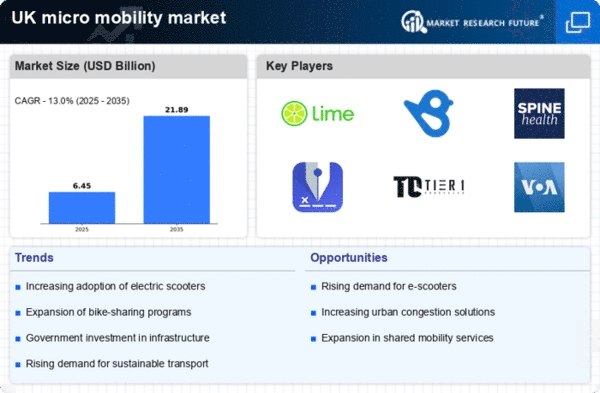Environmental Awareness
Growing environmental awareness among the UK population is a key driver of the micro mobility market. As concerns about climate change and pollution intensify, consumers are increasingly inclined to adopt sustainable transport options. Micro mobility solutions, which typically produce lower emissions than traditional vehicles, align with the values of eco-conscious individuals. Reports suggest that the adoption of e-scooters and e-bikes can reduce carbon footprints by up to 50% compared to car travel. This shift towards greener alternatives is supported by government initiatives aimed at promoting sustainable transport. As more individuals prioritize environmental considerations in their travel choices, the micro mobility market is likely to experience substantial growth, driven by a collective desire for cleaner urban environments.
Technological Advancements
Technological advancements play a crucial role in shaping the micro mobility market in the UK. Innovations in battery technology, GPS tracking, and mobile applications enhance the user experience and operational efficiency of micro mobility services. For instance, improvements in battery life allow e-scooters and e-bikes to cover longer distances, making them more appealing to users. Additionally, The integration of smart technology facilitates seamless access to services through mobile apps. This enables users to locate and rent vehicles easily. As technology continues to evolve, it is expected that the micro mobility market will benefit from enhanced safety features and improved service reliability. This technological evolution not only attracts new users but also encourages existing users to engage more frequently with micro mobility solutions.
Urban Congestion Mitigation
The micro mobility market in the UK is increasingly driven by the need to alleviate urban congestion. As cities grow, traffic congestion becomes a pressing issue. As cities grow, traffic congestion becomes a pressing issue, leading to longer commute times and increased pollution. Micro mobility solutions, such as e-scooters and e-bikes, offer a viable alternative for short-distance travel, potentially reducing the number of cars on the road. Recent studies indicate that micro mobility can decrease urban traffic by up to 30%, thereby enhancing the overall efficiency of urban transport systems. This shift not only benefits commuters but also contributes to improved air quality and reduced carbon emissions. As urban planners and local governments recognize the potential of micro mobility to address these challenges, investment in infrastructure and services supporting this market is likely to increase, further propelling its growth.
Cost-Effective Transportation
The micro mobility market in the UK is significantly influenced by the demand for cost-effective transportation options. With rising living costs, consumers are increasingly seeking affordable alternatives to traditional transport methods. Micro mobility solutions, such as bike-sharing and e-scooter rentals, provide an economical means of travel, often costing less than £2 for short trips. This affordability appeals particularly to younger demographics and urban dwellers who may not own a vehicle. Furthermore, the operational costs associated with micro mobility services are generally lower than those of public transport systems, making them an attractive option for both users and service providers. As the market continues to expand, the emphasis on affordability is likely to drive further innovation and competition within the micro mobility sector.
Urban Infrastructure Development
Urban infrastructure development is a significant driver of the micro mobility market in the UK. As cities invest in dedicated bike lanes, parking facilities, and charging stations, the usability and safety of micro mobility options improve. This infrastructure development is essential for encouraging the adoption of e-scooters and e-bikes, as it provides users with safe and convenient spaces to travel. Recent government reports indicate that cities with well-developed micro mobility infrastructure see a 40% increase in usage rates. Furthermore, as local authorities recognize the importance of integrating micro mobility into broader transport networks, funding for infrastructure projects is likely to increase. This trend not only supports the growth of the micro mobility market but also enhances the overall urban transport ecosystem.
















